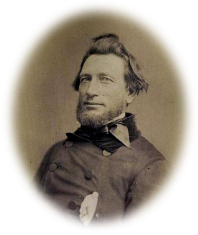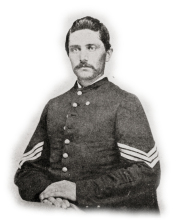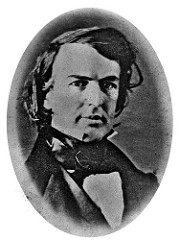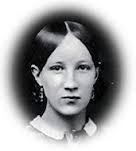Wednesday, 4th–Company drill in the forenoon and battalion drill in the afternoon. We get the St. Louis papers in camp every morning and keep posted on the movements of all parts of the army in the field.
American Civil War Chronicles
War Diary of Luman Harris Tenney.
December 4, 2021
4th. Was obliged to work hard in the commissary.
“Mr Seward says ‘we do not want any more men. The War is nearly over.'”—Horatio Nelson Taft
December 4, 2021
WEDNESDAY 4
Mercury at 24 this morning, the air pure and bracing, in the office as usual all day. Bought some wood and coal this morning, enough I think to last till “New Years.” By that time I think the Potomac will be open or clear of Batterys, but it may be closed with ice. Some indications of a movement over the River. According to the Report of the Sec’y of War, we have 600,000 men now in the field. Mr Seward says “we do not want any more men. The War is nearly over.” Spent an hour with Alex Williams at “Browns.”
______
The three diary manuscript volumes, Washington during the Civil War: The Diary of Horatio Nelson Taft, 1861-1865, are available online at The Library of Congress.
Rebel War Clerk
December 4, 2021
DECEMBER 4th.—We are now tasting the bitter fruits of a too indulgent treatment of our enemies. Yesterday Gen. Stuart’s cavalry and the 6th Regiment S. C. volunteers met with a bloody disaster at Drainsville. It appears that several of the traitors arrested and sent hither by Gen. Johnston were subsequently discharged by Gen. Winder, under the instructions of Mr. Benjamin, and sent to their homes, in the vicinity of Drainsville, at the expense of the government. These men, with revenge rankling in their breasts, reported to Gen. Stuart that a large amount of forage might be obtained in the vicinity of Drainsville, and that but a few companies of the enemy were in the neighborhood. The general believing these men to be loyal, since they seemed to have the confidence of the War Department, resolved to get the forage; and for that purpose started some 80 wagons early the next morning, escorted by several regiments of infantry and 1000 cavalry, hoping to capture any forces of the enemy in the vicinity. Meantime the Drainsville traitors had returned to their homes the preceding evening, and sent off intelligence to the headquarters of the enemy of the purpose of Gen. Stuart to send out in that direction, early the next day, a foraging party consisting of so many wagons, and small forces of infantry, artillery, and cavalry.
The enemy hastened away to Drainsville an overwhelming force, and ambuscaded the road, where it entered the woods, with artillery and men of all arms. Their line was the shape of a horse-shoe, and completely concealed from view.
Gen. Stuart had not entered far into the jaws of this trap, before some of his trusty scouts reported the presence of the enemy, Believing it to be only the pickets of the few companies previously reported, the general advanced still farther; but at the same time ordering the wagons to retire. He was soon undeceived by a simultaneous and concentric fire of artillery and musketry, which brought down many of his men. Nevertheless, he charged through the lines in one or two places, and brought his guns to bear with effect on such portions of the enemy’s line as were not wholly protected by the inequalities of the ground and the dense growth of woods. He quickly ascertained, however, that he was contending against vastly superior numbers, and drew off his forces in good order, protecting his wagons. The enemy did not pursue, for Stuart had rather more men than the informers reported to the enemy. But we lost 200 men, while the enemy sustained but little injury; their killed and wounded not exceeding 30.
This is the first serious wound inflicted on the country by Mr. Benjamin’s policy.
“But it is surprising how camp life enhances the capacities of some men.”–Journal of Surgeon Alfred L. Castleman.
December 4, 2021
4th.–The story of yesterday’s fight is all bosh. There were no two hundred prisoners taken–no fifteen killed–no fight–not a rebel seen! Munchausen must have been the legitimate son of a camp, or rather, the camp must be the legitimate progenitor of the whole race of Munchausen.
But it is surprising how camp life enhances the capacities of some men. I left home in July a dyspeptic. I came to Camp Griffin, in October, weighing one hundred and thirty-nine pounds. I record here, as something worth my remembering, an extract of a letter written to-day to a friend inquiring how camp life affected my health:
” * * * I weigh now one hundred and fifty pounds. I have almost recovered my appetite. With other things in proportion, I now take three cups of coffee for breakfast, three cups tea at dinner, two cups at tea, and eat five meals a day, or suffer from hunger. My last meal is usually taken at 11 to 12 o’clock at night, and consists of one or two chickens, or a can of oysters, with a pot of English pickled cauliflower. With that I contrive to get through the night.
“But with the morrow’s rising sun
The same dull round begins again.”
“Last night, however, I was so unfortunate as to have no chickens. My can of oysters was sour, and I had to put up with a single head of boiled cabbage, half a dozen cold potatoes, and some cold boiled beef. I wonder what I shall do when we get away from the neighborhood of Washington to where there is no market, no oysters, no chickens, no cabbage, no cauliflower, ‘no nothin’.’ I shall be compelled to settle back to dyspepsia, and have no appetite.”
Presentation of standards at Arlington.—Dinner at Lord Lyons’.—William Howard Russell’s Diary.
December 4, 2021
December 4th.–To Arlington, where Senator Ira Harris presented flags–that is, standards–to a cavalry regiment called after his name; the President, Mrs. Lincoln, ministers, generals, and a large gathering present. Mr. Harris made a very long and a very fierce speech; it could not be said Ira furor brevis est; and Colonel Davies, in taking the standard, was earnest and lengthy in reply. Then a barrister presented colour No. 2 in a speech full of poetical quotations, to which Major Kilpatrick made an excellent answer. Though it was strange enough to hear a political disquisition on the causes of the rebellion from a soldier in full uniform, the proceedings were highly theatrical and very effective. “Take, then, this flag,” &c.–”Defendit with your,” &c.–” Yes, sir, we will guard this sacred emblem with –,” &c. The regiment then went through some evolutions, which were brought to an untimely end by a feu de joie from the infantry in the rear, which instantly broke up the squadrons, and sent them kicking, plunging, and falling over the field, to the great amusement of the crowd.
Dined with Lord Lyons, where was Mr. Gait, Financial Minister of Canada; Mr. Stewart, who has arrived to replace Mr. Irvine, and others. In our rooms, a grand financial discussion took place in honour of Mr. Gait, between Mr. Butler Duncan and others, the former maintaining that a general issue of national paper was inevitable. A very clever American maintained that the North will be split into two great parties by the result of the victory which they are certain to gain over the South–that the Democrats will offer the South concessions more liberal than they could ever dream of, and that both will unite against the Abolitionists and Black Republicans.
Downing’s Civil War Diary.–Alexander G. Downing.
December 3, 2021
Tuesday, 3d–Nothing of importance. It is quite noticeable that the men are now holding their heads erect without wearing the “dog collars” around their necks.
War Diary of Luman Harris Tenney.
December 3, 2021
3rd. Reached Camp Denison where were encamped 8,000 troops.
Diary of Horatio Nelson Taft
December 3, 2021
TUESDAY, DECEMBER 3, 1861.
This has been the coldest day of the season yet. M. this morning stood at 28. Have been in the office all day. No particular news afloat. Went down to the Ave after dinner, bot some Carpeting of “Barnes and Mitchel,” 20 yards for dining room and 28 yards stairs Carpet. Wife went down and selected it. Called at Willards. Saw Hugh Hastings of Albany and some other gentlemen who I knew from NY. Came home about 7 o’c., read the Presidents Message which was delivered to Congress today. A plain, practical document.
______
The three diary manuscript volumes, Washington during the Civil War: The Diary of Horatio Nelson Taft, 1861-1865, are available online at The Library of Congress.
J.B. Jones records visit of several members of Confederate Congress and their concern over Yankees and others permitted to be continually running to the enemy.
December 3, 2021
DECEMBER 3d.—Several members of Congress came into my office and denounced the policy which the government seemed to have adopted of permitting Yankees, and those who sympathize with them, to be continually running over to the enemy with information of our condition, and thus inviting attacks and raids at points where we are utterly defenseless. They seemed surprised when I told them that I not only agreed with them entirely, but that I had really written most of the articles they had read in the press denunciatory of the policy they condemned. I informed them, moreover, that I had long since refused to sign any such passports as they alluded to, at the risk of being removed. They said they believed the President, in his multiplicity of employments, was not aware of the extent of the practice, and the evil effects it was certain to entail on the country; and it was their purpose to wait upon him and remonstrate against the pernicious practice of Mr. Benjamin.
“We are getting tired of McClellan’s want of vim. How long is he going to be ‘getting ready?’”–Journal of Surgeon Alfred L. Castleman.
December 3, 2021
December, 3d.–There is a rumor here to-day that our troops are in possession of both Savannah and Pensacola. I do not believe it.
What do our leaders mean to do with us this winter? Here we are, the 3d December, a cold, freezing, windy day, in our open tents, without intimation of what we are going to do– with no more preparation for winter quarters than we had a month ago. Are we to be kept in this condition all winter? We are getting tired of McClellan’s want of vim. How long is he going to be “getting ready?” All is conjecture, except that the wind howls dreadfully around our tents this cold night.
This morning the three divisions of the army here sent out five hundred to a thousand men each, to beat the bush. This moment comes the statement that they woke up about four hundred rebel cavalry, surrounded them, and that they are even now endeavoring to fight their way out; that they have killed about fifteen of our men; that we have taken about two hundred prisoners, and are fishing in the dark for the rest. All this may be true, but I am getting to be a great doubter of the truth of anything I hear in camp. We shall know all about it to-morrow.
Colonel D’Utassy.—An ex-pugilist turned Senator.—Mr. Cameron.—Ball in the officers’ huts.—William Howard Russell’s Diary.
December 3, 2021December 3rd.–Drove down to the Capitol, and was introduced to the floor of the Senate by Senator Wilson, and arrived just as Mr. Forney commenced reading the President’s message, which was listened to with considerable interest. At dinner, Colonel D’Utassy, of the Garibaldi legion, who gives a curious account of his career. A Hungarian by birth, he went over from the Austrian service, and served under Bern; was wounded and taken prisoner at Temesvar, and escaped from Spielberg, through the kindness of Count Bennigsen, making his way to Semlin, in the disguise of a servant, where Mr. Fonblanque, the British consul, protected him. Thence he went to Kossuth at Shumla, finally proceeded to Constantinople, where he was engaged to instruct the Turkish cavalry; turned up in the Ionian Islands, where he was engaged by the late Sir H. Ward, as a sort of secretary and interpreter, in which capacity he also served Sir G. Le Marchant. In the United States he was earning his livelihood as a fencing, dancing, and language master; and when the war broke out he exerted himself to raise a regiment, and succeeded in completing his number in seventeen days, being all the time obliged to support himself by his lessons. I tell his tale as he told it to me.
One of our friends, of a sporting turn, dropped in tonight, followed by a gentleman dressed in immaculate black, and of staid deportment, whose name I did not exactly catch, but fancied it was that of a senator of some reputation. As the stranger sat next me, and was rubbing his knees nervously, I thought I would commence conversation.
“It appears, sir, that affairs in the south-west are not so promising. May I ask you what is your opinion of the present prospects of the Federals in Missouri?” [continue reading…]
Downing’s Civil War Diary.–Alexander G. Downing.
December 2, 2021
Monday, 2d–It turned warm today and the snow is all gone. I was on guard for the first time here at the barracks. We have to walk the beats with our overcoats on. A man on this, the west side, of the camp was engaged in cleaning his rifle today, when by some movement it was accidentally discharged and hit and killed a soldier on the other side of the grounds.
War Diary of Luman Harris Tenney.
December 2, 2021
2nd. Wrote and sent a package to Fannie. Bid the friends good-bye and left for Camp Denison. A noisy time–boys drunk– slept in caboose.
Army Life of an Illinois Soldier, Charles Wright Wills.
December 2, 2021
Monday, December 2, 1861.
While I was writing last night there really was a Rebel gunboat came up the river and fired into Fort Holt. Impudent, wasn’t it? The Fort replied, and Fort Cairo also shot a couple of shells over our heads toward the rascals, but they fell short. We could see the troops at Fort Holt out under arms for an hour. Taylor’s battery went off down the Norfolk road at a slashing pace to try and get a shot at the boat but was too late.
It is very cold this morning and snowing again. We are perfectly comfortable, though.
David L. Day thinks the 25th Mass is fortunate under Foster, who was with Anderson at Fort ‘Sumpter.’
December 2, 2021
The Troops Brigaded.
Dec. 2. The troops encamped around here have been formed into three brigades, and will be commanded by Brigadier Generals Foster, Reno and Parke; the whole to be under command of Gen. A. E. Burnside and known as Burnside’s coast division. Our regiment has been assigned the right of the first brigade, comprising the 25th, 23d, 24th and 27th Massachusetts and 10th Connecticut regiments, under command of Brig. Gen. John G. Foster, U. S. A. I think we are fortunate in our commander, as he appears to me like a man who understands his business. Gen. Foster is a regular army officer, ranking as captain of engineer! He served in the Mexican war, and was with Major Anderson at the storming and surrender of Fort Sumpter. He has recently been commissioned brigadier general of volunteers. Judging from appearances, I have great faith in him as an able commander.
Convening of Congress—Horatio Nelson Taft
December 2, 2021
MONDAY 2
A fine cool day again. The great event has been the convening of Congress. A quorum was present and a great crowd was there. No particular news today. Young H N Jr is makeing an effort to get the place of Page in the “House.” Went down to the Ave this evening, bot Harpers Mag. and Frank Leslies Pictorial. Called at Barnes & Mitchels, came home by seven o’clock and staid there.
______
The three diary manuscript volumes, Washington during the Civil War: The Diary of Horatio Nelson Taft, 1861-1865, are available online at The Library of Congress.
John B. Jones remarks on General Lee.
December 2, 2021
DECEMBER 2d.—Gen. Lee has now been ordered South for the defense of Charleston and Savannah, and those cities are safe! Give a great man a field worthy of his powers, and he can demonstrate the extent of his abilities; but dwarf him in an insignificant position, and the veriest fool will look upon him with contempt. Gen. Lee in the streets here bore the aspect of a discontented man, for he saw that everything was going wrong; but now his eye flashes with zeal and hope. Give him time and opportunity, and he will hurl back the invader from his native land; yes, and he will commend the chalice of invasion to the lips of the North ; but not this year—it is too late for that.
Opening of Congress.—William Howard Russell’s Diary.
December 2, 2021
December 2nd.–Congress opened to-day. The Senate did nothing. In the House of Representatives some Buncombe resolutions were passed about Captain Wilkes, who has become a hero–”a great interpreter of international law,” and also recommending that Messrs. Mason and Slidell be confined in felons’ cells, in retaliation for Colonel Corcoran’s treatment by the Confederates. M. Blondel, the Belgian minister, who was at the court of Greece during the Russian war, told me that when the French and English fleets lay in the Piraeus, a United States vessel, commanded, he thinks, by Captain Stringham, publicly received M. Persani, the Russian ambassador, on board, hoisted and saluted the Russian flag in the harbour, whereupon the French Admiral, Barbier de Tinan, proposed to the English Admiral to go on board the United States vessel and seize the ambassador, which the British officer refused to do.
Village Life in America
December 1, 2021
December 1.–Dr Carr is dead. He had a stroke of paralysis two weeks ago and for several days he has been unconscious. The choir of our church, of which he was leader for so long, and some of the young people came and stood around his bed and sang, “Jesus, Lover of My Soul.” They did not know whether he was conscious or not, but they thought so because the tears ran down his cheeks from his closed eyelids, though he could not speak or move. The funeral was from the church and Dr Daggett’s text was, “The Beloved Physician.”
Downing’s Civil War Diary.–Alexander G. Downing.
December 1, 2021
Sunday, 1st–We had a big snowstorm last night. It came my turn to go on camp guard for the first time. It takes some five hundred men to go around the camp.
War Diary of Luman Harris Tenney.
December 1, 2021
Dec. 1st. Sunday. Spent in camp and at Uncle’s. Was paid off.
“This will be a very important Session, the most important perhaps that has been convened for half a Century at least.”—Horatio Nelson Taft
December 1, 2021
SUNDAY, DECEMBER 1
This has been a fine cool day, no frost but a fresh wind. Wife and the boys went to church. Julia went to the Episcopal church with Miss Hartly, it was Doct Pinckneys church. I have been in the house nearly all day reading &c. Went down town this evening, was at the “National” an hour or so, met several members of Congress who are here ready for the morrow. This will be a very important Session, the most important perhaps that has been convened for half a Century at least.
The three diary manuscript volumes, Washington during the Civil War: The Diary of Horatio Nelson Taft, 1861-1865, are available online at The Library of Congress.
“I tried some of the “venison” but it tasted strangely like hog.”–Army Life of an Illinois Soldier, Charles Wright Wills.
December 1, 2021
Bird’s Point, Mo., December 1, 1861.
This, the beginning of winter, is the warmest and altogether the most pleasant day we have had for several weeks. During our whole trip to Bloomfield and back we had splendid weather, but ever since our return it has been at least very unsplendid. The climax was reached day before yesterday and capped with several inches of snow. I was up the river 15 miles at the time with a party loading a flatboat with logs for our huts. We had a sweet time of it and lots of fun. The mud was from six inches to a foot deep, and by the time we got the logs to the boat they were coated with mud two inches thick, and before we got a dozen logs on the boat we had a second coat on us, from top to toe of mud. It snowed and rained all the time we worked but I heard no complaint from the men, and in fact I have never seen so much fun anywhere as we had that day. There is any amount of game where we were, the boys said that were out, and they brought to camp several skinned “deer.” I tried some of the “venison” but it tasted strangely like hog.
Of course drill is discontinued for the present, and as working on the quarters is almost impossible we sit and lie in the tent and gas and joke and eat and plan devilment. We have a barrel of apples now, lots of pecans and tobacco and not a thing to trouble us. The enemy have quit coming around here and we can stroll six or seven miles without danger if we get past our pickets safely. There was a great deal of firing down at Columbus yesterday and I heard some more this morning. I don’t know whether the gunboats are down or not. It may be the Rebels are practicing with their big guns; or maybe they are firing a salute over the fall of Fort Pickens. It will be a great joke if they take that, won’t it? [continue reading…]
Rebel War Clerk
December 1, 2021
DECEMBER 1st.—The people here begin to murmur at the idea that they are questioned about their loyalty, and often arrested, by Baltimore petty larceny detectives, who, if they were patriotic themselves (as they are all able-bodied men), would be in the army, fighting for the redemption of Maryland.
